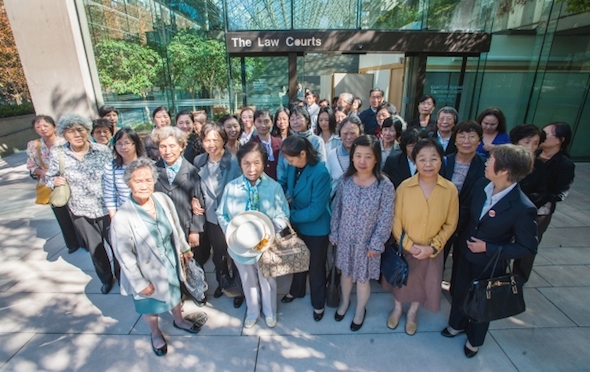Vancouver bylaw banning Falun Gong protests is ‘repugnant to Canadian values’: lawyer
The Province
BY SUSAN LAZARUK, THE PROVINCE SEPTEMBER 16, 2014

Photograph by: Arlen Redekop , Province
Banning practitioners of a Chinese religious sect from protesting outside the Chinese consulate in Vancouver is “dictatorial” and is reminiscent of repressive regimes like China.
The Falun Gong was in B.C. Supreme Court in Vancouver on Monday for the second time in four years to try to have the City of Vancouver’s new bylaw governing public protests declared unconstitutional and invalid.
The latest amendment to a city bylaw that prohibits protesters from erecting permanent structures on city property, such as the hut Falun Gong protesters had used for years, is “unreasonable, bordering on the ludicrous,” their lawyer, Cameron Ward, told the court.
The courtroom was half-full with about 60 practitioners of the ancient spiritual practice that’s banned in China.
Practitioners of Falun Gong, also known as Falun Dafa, want to be able to resume an round-the-clock vigil on a grassy portion of a city street outside the consulate, located in the 3300 block of Granville Street in Vancouver.
But a second amendment the city made to Sec. 71 of the Street and Traffic Act after being ordered to do so by the Court of Appeal in an earlier constitutional challenge by Falun Gong, is also unconstitutional because it infringes on his clients’ rights to freedom of political expression, Ward argued.
He called the new bylaws’ restrictions “draconian.”
“The City of Vancouver says it will dictate when, where and how citizens will express themselves,” he said. “The city’s dictatorial approach is repugnant to Canadian values and more like regimes like the People’s Republic of China.”
Ward argued if someone unhappy with the B.C. teachers strike wanted to hold up a sign of a certain size outside a fundraiser for the B.C. premier, he would need a permit and wouldn’t be able to protest past 8 p.m.
He also said that protester would not be able to apply for a permit for a second month, if the strike continued.
“These are not far-fetched (examples),” he told court. “They demonstrate how draconian the amended bylaw is in its application.”
City staff in February 2009 removed the protesters’ erected banners and a small hut they used to maintain their 24/7 vigil to protest what are documented human rights violations against practitioners in China.
The hut and banners, with photos showing the human rights violations and anti-China slogans, had first been set up outside the consulate on Aug. 20, 2001.
The City of Vancouver redrafted the bylaw to prevent the protesters’ continuous vigil and won an earlier court challenge.
But that was successfully appealed to the Court of Appeal, which found the bylaw unconstitutional and ordered the city to redraft it, which it did.
“It (the new bylaw) fails to pass constitutional muster and (the bylaw) or portions of it should be struck down and rendered invalid,” said Ward.
He is asking the court to order the city “back to the board, to create a constitutional bylaw” because he argued that Vancouver residents should be allowed to express themselves “clearly and continuously, if they like,” on important issues.
Ward said he expects city lawyers to argue the restrictions in the new bylaw, designed to keep city streets free of obstructions, are reasonable, allowed under Sec. 1 of the Charter of Rights and Freedoms.
He said the city is expected to argue the bylaw imposes only a minimal infringement on the protesters’ rights, which allows them to continue to protest with hand-held instead of erected signs.
“We say that the city has prohibited structures in a manner that is constitutionally unsound, while my (lawyer) friends in the city take the opposite view,” said Ward.
Ward also recounted an earlier court decision that included arguments that the Chinese consulate was unhappy with the Falun Gong vigil, the city was aware of China’s unhappiness and the protest had impaired the dignity of the consulate and was an irritant to Canada’s trade negotiations with China.
That judge in that ruling had found “the city had not acted to silence the protesters at the behest of the Chinese government,” said Ward.
Falun Gong spokeswoman Sue Zhang said the hut and banners are important to the protest, especially as it alerts Chinese tourists, who pass by the site on the way to and from the airport, to the fact that Falun Gong is practised outside of China, contrary to what they hear from the Chinese government.
